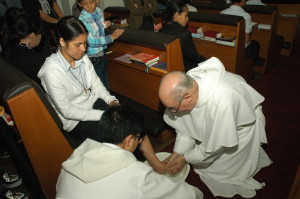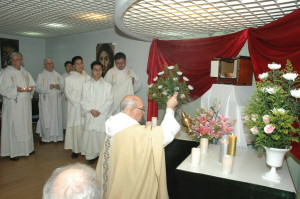Today is a very special day for the Christian Community all over the world. The celebration of the Eucharist is always a memorial of the death and resurrection of Christ, our Savior, but today is, if I may say so, even more.
In the Jewish solemn celebration of the Passover Festival, commemorating their return home from Egypt, where they had undergone a long harsh period of several centuries of slavery, at a given a child, the youngest one of the family, asks aloud: “why is it that tonight is different?†And the father of the family answers the question narrating the epic of Exodus and the liberation by God of the people of Israel from captivity.
This is also the way how Jesus and his disciples celebrated the Passover for many years… But this time it was going to be special, truly special, “differentâ€â€¦
Why is special today? Among other things, because Jesus introduced several events that speak of the newness in this night’s traditional feast, and of his goal to bring salvation to humanity. St John’s gospel spells them out for us and sums them up in two: a) the institution of the Eucharist, memorial of his passion until he comes again, b) the commandment of fraternal love, following his own example. “Love one another. As I have loved you, so you must love one another†(Jn 13, 34).
This is one of the most crucial moments in Jesus’ life. “Jesus knew that the hour had come for him to leave this world and go to the Father†(Jn 13, 1).  The time left was short: “My childrenâ€, he tells them, “I shall not be with you much longer… And now I give a new commandment: Love one another. As I have loved you, so you must love one anotherâ€. He leaves them his “Testament of loveâ€, signed by his own blood. And he tells them the signal by which people of all times will recognize that they are his disciples: “If you have love for one another, then everyone will know that you are my disciples†(Jn 13, 34-35).
Then he proceeds to manifest his love for them through two very special, significant gestures that point towards fraternal love:
–The washing of their feet, narrated -in ‘slow motion’- by John, is a “signâ€, the prelude of his passion and the key for its understanding: the passion of Jesus is a service of fidelity and love until the extreme.
“Jesus’ action of washing the feet of his disciples was unusual, for his gesture went beyond the required laws of hospitality (washing of hands) to what was, in appearance, a menial task, a task of slaves. Despite the short dialogue established with Peter, the Lord’s action was probably unrelated to matters of ritual purity according to the Law…
At the time of Jesus it was prescribed that the host of a banquet was to provide water (and a basin) so that his guests could wash their hands before sitting down to table. Although a host might also provide water for travelers to wash their own feet before entering the house, the host himself would not wash the feet of his guests. According to the Jewish law and traditions, the washing of feet was forbidden to any Jew except those in slaveryâ€.
The washing of the feet does not show only an act of humility, but the salvific act of Jesus to give life to the world. Washing the feet to his disciples is a way of challenging all forms of despotic authoritarian government, and teaches us a different way of being community, as true brothers in equal conditions of dignity and service.
For the Christian Community the Washing of the feet is: a revelation, not a strange occurrence, but the supreme teaching, love made servant and slave; it is a revolution: God cannot endure that anyone of his children would lord it over the others, or be violent, oppressor, etc. And it is also an example, a challenge for the Church of all times which, out of love for Jesus, must diligently seek the needy and become herself poor with them.
-The other gesture is The Common Table, –not any longer standing,  with a walking stick in their hand, but reclined around the table, as free men/women-  where they shared for the first time the eucharistic meal of Jesus’ body and blood. The mandate of Jesus “do this in memory of me†originates the repetition of the Eucharist, and therefore, the permanent convocation of the church assembly throughout the centuries, made possible thanks to the priestly ministry of the bishops and the priests in continuity with the apostles at de Cenacle.
In the last supper we are witnessing two very different kinds of donations: that of Jesus giving himself fully to his friends in the Eucharist: This bread is my body given to feed you, so that you won’t hunger; this wine is my blood, shed for you to quench your thirst.
To this donation without limits Judas responds with his unspeakable betrayal known by Jesus beforehand: “One of you is going to betray me†(Jn 13, 21). Judas walks out of the Cenacle, lighted for the occasion; from the company of his friends; from the warmth of the Paschal meal, away from Jesus, his Master and friend, who wants him to reconsider what he has planned to do. But Judas got up and went on his way into deep darkness: “it was nightâ€. It was the mystery of iniquity, hard to understand…
-My dear brothers and sisters: There is a Spanish popular saying that reads like this: “amor con amor se pagaâ€: “love is paid with loveâ€. We cannot close this celebration without first thanking our Lord for all he has done for us.
-As one of our brothers has said: “Jesus did not catalogue persons as ‘good’ and ‘evil’, but as ‘those who see, and those who do notâ€. Let our lives reflect that of Jesus, so that they can be truly enlightening for those who need to seeâ€.
-We should always remember that, as Saint John of the Cross says, “At sunset of life, we shall be examined in loveâ€. Love is our distinctive sign that we are followers of Jesus. And we should equally remember that, at the sunset of life, we shall be judged by Him who died on a cross paying a high ransom for our salvation…
-The great question we can ask ourselves is not so much “will I be saved?†but rather, how should my life be, to be more faithful to God’s love for me?
Give oneself freely, as Jesus, or betray the brother, as Judas, is the dilemma that life constantly presents to us. Our option as Christians cannot be other but that of Jesus in a day such as today: to love the others as Jesus loved us.
José Luis de Miguel, OP
Prior
St. Dominic’s Priory, Macau
Â
…



